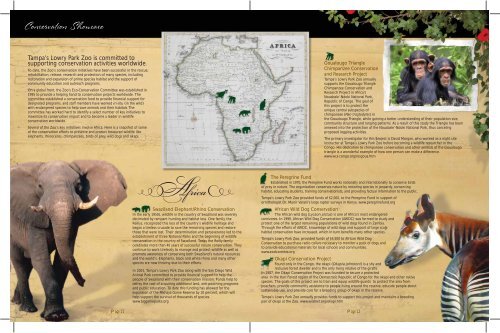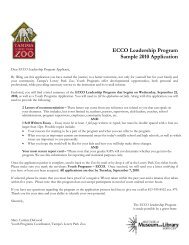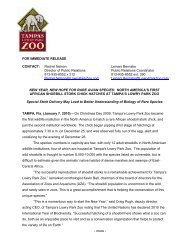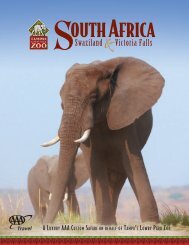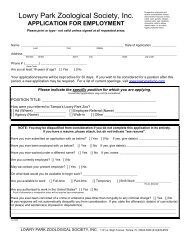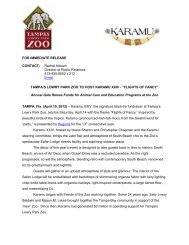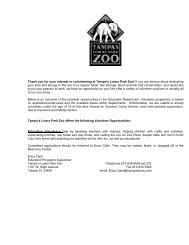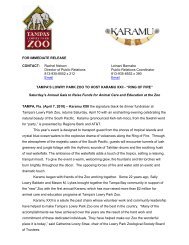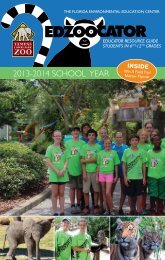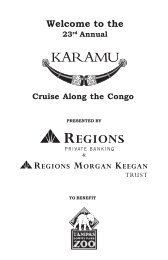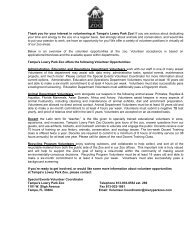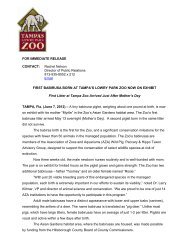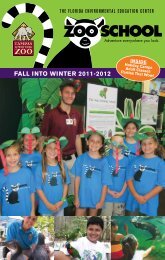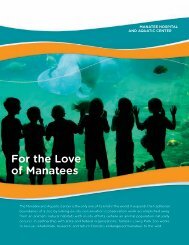Annual Report 2007 - Tampa's Lowry Park Zoo
Annual Report 2007 - Tampa's Lowry Park Zoo
Annual Report 2007 - Tampa's Lowry Park Zoo
- No tags were found...
Create successful ePaper yourself
Turn your PDF publications into a flip-book with our unique Google optimized e-Paper software.
Conservation ShowcaseTampa’s <strong>Lowry</strong> <strong>Park</strong> <strong>Zoo</strong> is committed tosupporting conservation activities worldwide.To date, the <strong>Zoo</strong>’s conservation initiatives have been successful in the rescue,rehabilitation, release, research and protection of many species, includingrestoration and expansion of prime species habitat and the support ofcommunity education and outreach programs.On a global front, the <strong>Zoo</strong>’s Eco-Conservation Committee was established in1995 to provide a helping hand to conservation projects worldwide. Thecommittee established a conservation fund to provide financial support fordesignated programs, and staff members have worked in-situ (in the wild)with endangered species to help save animals and their habitats Thecommittee has worked hard to identify a select number of key initiatives tomaximize its conservation impact and to become a leader in wildlifeconservation worldwide.Several of the <strong>Zoo</strong>’s key initiatives involve Africa. Here is a snapshot of someof the conservation efforts to preserve and protect treasured wildlife likeelephants, rhinoceros, chimpanzees, birds of prey, wild dogs and okapi.Goualougo TriangleChimpanzee Conservationand Research ProjectTampa’s <strong>Lowry</strong> <strong>Park</strong> <strong>Zoo</strong> annuallysupports the Goualougo TriangleChimpanzee Conservation andResearch Project in Africa’sNouabale’-Ndoki National <strong>Park</strong>,Republic of Congo. The goal ofthis project is to protect theunique central subspecies ofchimpanzee (Pan troglodytes) inthe Goualougo Triangle, while gaining a better understanding of their population size,community structure and ranging patterns. As a result of this study the Triangle has beenannexed into the protection of the Nouabale’-Ndoki National <strong>Park</strong>, thus cancelingproposed logging activities.The primary investigator for this project is David Morgan, who worked as a night siteinstructor at Tampa’s <strong>Lowry</strong> <strong>Park</strong> <strong>Zoo</strong> before becoming a wildlife researcher in theCongo. His dedication to chimpanzee conservation and other animals of the Goualougotriangle is a wonderful example of how one person can make a difference.www.wcs-congo.org/resgoua.htmThe Peregrine FundEstablished in 1970, the Peregrine Fund works nationally and internationally to conserve birdsof prey in nature. The organization conserves nature by restoring species in jeopardy, conservinghabitat, educating students, training conservationists, and providing factual information to the public.Swaziland Elephant/Rhino ConservationIn the early 1950s, wildlife in the country of Swaziland was severelydecimated by rampant hunting and habitat loss. One family, theReillys, recognized this loss of the country’s wildlife heritage andbegan a tireless crusade to save the remaining species and restorethose that were lost. Their determination and perseverance led to theestablishment of three National <strong>Park</strong>s and the beginning of wildlifeconservation in the country of Swaziland. Today the Reilly familycelebrates more than 40 years of successful nature conservation. Theycontinue to work tirelessly to manage and protect wildlife as well aspromote awareness of conserving both Swaziland’s natural resourcesand the world’s. Elephants, black and white rhino and many otherspecies are now thriving due to their efforts.In 2003, Tampa’s <strong>Lowry</strong> <strong>Park</strong> <strong>Zoo</strong> along with the San Diego WildAnimal <strong>Park</strong> committed to provide financial support to help thepeople of Swaziland with their conservation mission. Funds help todefray the cost of acquiring additional land, anti-poaching programsand public education. To date this funding has allowed for theexpansion of the Mkhaya Game Reserve by 10 percent, which willhelp support the survival of thousands of species.www.biggameparks.orgTampa’s <strong>Lowry</strong> <strong>Park</strong> <strong>Zoo</strong> provided funds of $2,000, to the Peregrine Fund in support ofornithologist Dr. Munir Varani’s large raptor surveys in Kenya. www.peregrinefund.orgAfrican Wild Dog ConservationThe African wild dog (Lycaon pictus) is one of Africa’s most endangeredcarnivores. In 1999, African Wild Dog Conservation (AWDC) was formed to study andprotect one of the largest remaining populations of wild dogs found in Zambia.Through the efforts of AWDC, knowledge of wild dogs and support of large scalehabitat conservation have increased, which in turn benefits many other species.Tampa’s <strong>Lowry</strong> <strong>Park</strong> <strong>Zoo</strong>, provided funds of $4,500 to African Wild DogConservation to purchase radio collars necessary to monitor a pack of dogs andto provide educational materials for local schools and communities.www.awdczambia.orgOkapi Conservation ProjectFound only in the Congo, the okapi (Okapia johnstoni) is a shy andreclusive forest dweller and is the only living relative of the giraffe.In 1987, the Okapi Conservation Project was founded to secure a protectedarea in the Ituri Forest region of the Democratic Republic of Congo for the okapi and other nativespecies. The goals of this project are to train and equip wildlife guards to protect the area frompoachers, provide community assistance to people living around the reserve, educate people aboutsustainable use, and provide care for a breeding group of okapi in the reserve.Tampa’s <strong>Lowry</strong> <strong>Park</strong> <strong>Zoo</strong> annually provides funds to support this project and maintains a breedingpair of okapi at the <strong>Zoo</strong>. www.wildnet.org/okapi.htmPage 11 Page 12


